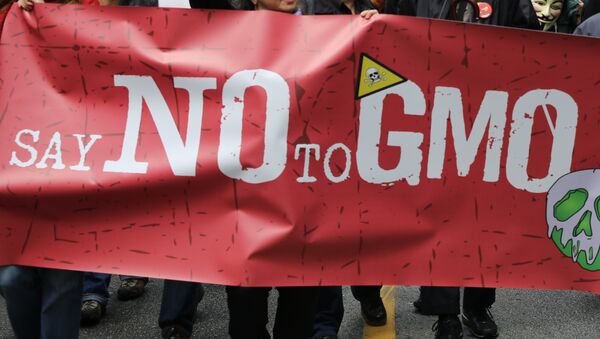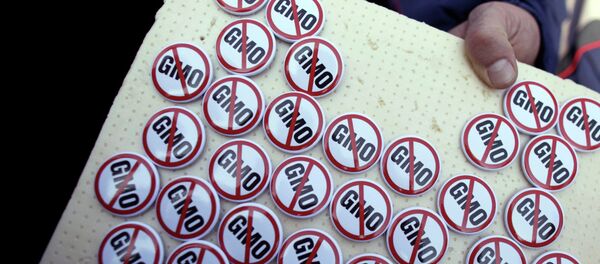"As far as the federal government is concerned, starting in about 1992 when the first policy was issued by the FDA [US Food and Drug Administration], genetically modified crops are [considered] no different than hybrid crops," Professor of Urban and Environmental Policy and Planning at Tufts University, Sheldon Krimsky told Sputnik Thursday. "And unless you can show a reason why they should be labeled, they will not be labeled."
On Wednesday, hundreds of protesters rallied in Washington, DC against a House hearing on the Safe and Accurate Food Labeling Act of 2014 bill, introduced by Republican Representative Mike Pompeo of Kansas, to grant full authority to the FDA to determine labeling requirements for foods with GMO ingredients. If passed the bill would deny states the right to label products with GMO ingredients.
Although many critiques around the United States argue that consumers should have the right to know what is in their foods, other experts argue that these critiques make up only a small vocal anti-GMO minority group and that the vast majority of American consumers do not have a preference of what goes into their foods.
"I think American consumers are generally more used to low cost food and generally the majority population [of Americans] is generally less concerned with some of the perceived quality issues [of food]," Agricultural Resource and Economic Policy Professor at Colorado State University Gregory Graff told Sputnik.
"The benefits [of GMO labeling] are that these people will have a greater choice in the marketplace," Krimsky said. "But the people who will lose by it [GMO labeling] are the companies and also the federal government because they've committed themselves so much to the trust of their expertise that they will lose the trust of the people."
Graff argues that American consumers are satisfied with the existing organic food labeling policy in the United States. He adds that mandatory GMO labeling would mostly affect only those who care about organic foods.
"The mandatory GMO labeling…really just allows people to exercise a personal preference…but surveys have shown that a large segment of the US population does[n]'t have much in the way [of] a strong personal preference about this [GMO labeling]…" Graff said. "At the end of the day, what it [GMO labeling] could end up doing is attracting some consumers away from organic foods and towards conventional foods labeled as GMO free."
While over 60 countries around the world require manufacturers to label foods containing GMO ingredients, the United States and Canada do not require mandatory GMO labeling.






